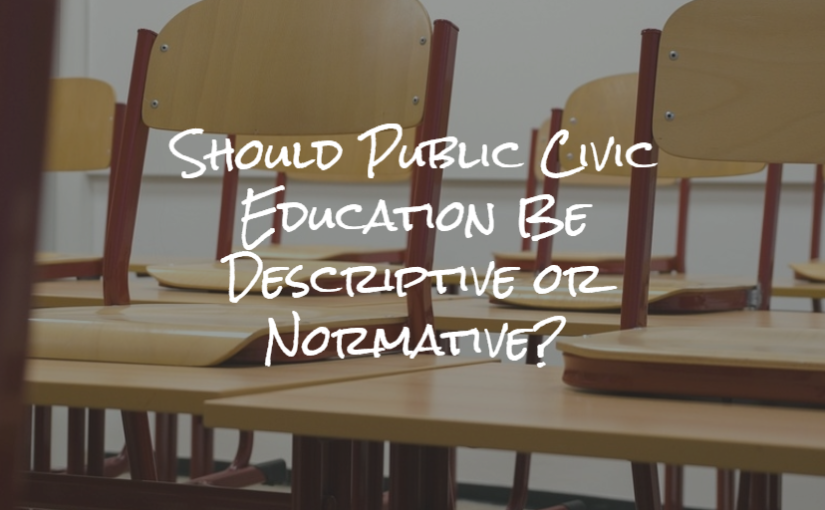Over at The Conversation, Peter Levine lays out what he takes to be the state of the art on US civic education in public schools in response to criticism from education scholar Jonathan Zimmerman. Levine recounts some basic facts: the vast majority of students study something called “civics,” and they usually have a good basic understanding of our founding documents. Yet students can rarely apply that basic understanding to contemporary politics and current events, and they largely fail to learn about the mainstream political beliefs of their fellow citizens, and thus only a very small percentage (10% in 2012) could be said to exit high school as “informed voters.”
Unfortunately, we have come to expect that our public schools will solve the political problems of adults, as when Jonathan Zimmerman accused our public schools of failing to teach “the country’s future citizens how to engage respectfully across their political differences.” But here’s the problem: how can adults embroiled in adversarial political speech agree on a curriculum to teach their children how to be less adversarial?
What we have tended to do is to reduce civic education to volunteerism and community service. Some schools, mostly in richer and whiter neighborhoods, also allow students an opportunity to develop more adversarial skills in civil and protected contexts by discussing social problems and current events. It’s almost always sensible to call for a more equitable distribution of instructional resources in such cases, and this is no exception. Poor and non-white students should have the same opportunities–and receive the same kinds of disciplinary treatement–as white and rich students.
But we haven’t really resolved the relevant questions: if presidential candidates are arguing about whether some of the students in the civics classroom should be deported immediately because they (or at least their parents) are rapists and murderers, how can the students in that classroom work through those claims civilly while preserving both the kind of partisan neutrality and inclusiveness we expect of public schooling? What should schools do about the fact that politicians are frequently both wrong and immoral in ways that violate educational norms? How can civics education be civil if civic engagement rarely is?
My sense, following Hannah Arendt, is that it is rarely possible for educational institutions to resolve problems in the larger polis, and that efforts to do so usually end up being illegitimate to the citizens who are asked to trust their children to the state for cultivation. Thus it is inherently undemocratic, even when fundamental human rights are at stake. I’m generally okay with the ways in which human rights are designed to trump democratic outcomes, but it’s worth noting that when a democratically organized citizenry puts its mind to it, they’ll generally find the levers of power required to overcome more accurate or fair bureaucratic and judicial outcomes.
And that’s perhaps where Arendt becomes less useful: she diagnoses the problem but retreats to a kind of educational purity that’s unacceptable. Over the last sixty years, we’ve been treating schools and other educational institutions as sites of democratic contestation. Our schools are shared spaces where we can have proxy battles about facts, norms, and strategies that ought to dominate in the larger polis. That’s perhaps unfortunate for the students who must live and learn in the partisan battleground, but it’s unavoidable.
On this view, students don’t learn politics (just) in civics class; they learn politics from their parents’ and teachers’ reactions to standardized testing, curriculum requirements, and budget and redistricting battles. They even become political agents of their own–long before they become eligible to vote–by crafting their own responses to those problems and organizing on their own issues.
I always learn something new from Levine on issues in civic education, and this latest contribution is no exception. But I do think we need to move beyond the curriculum-first model of civic education to a (gasp) more Deweyan account of the ways that schools are disciplinary institutions that hide their most important political lessons behind the rhetoric of professional normalization. The most important civic lessons are the forms of life that schools prepare us to live in a society where our political agency has become increasingly hamstrung and our fellow citizens increasingly polarized.
Our schools are pretty good at teaching future citizens to sit still, respect authority, and constantly try to achieve success within a narrow definition of what that means. They’re also very good at producing delinquency, as Levine himself mentions in citing the Kupchick/Catlaw paper on the relationship between disciplinary contact and political paralysis.
So let me end with a metaphor: our democracy is like a ship that we must mend and repair at sea, working on the planks and spars while using them to stay afloat. There is no hope of returning to dry dock to tinker and optimize, every institution is simultaneously bearing the strain of our policy-making and disputes even as its weaknesses and flaws are buckling under that pressure. Thus: discussions of schools as apolitical spaces from whence we safely prepare non-citizens for the rigors and dangers of politics are always going to be founded on an error.
Zimmerman is pretending that the appropriate response to detestable policies ought to be civil disagreement, and that the appropriate response to the appeal of Trump’s incivility must be to educate (read: discipline) such behavior out of the next generation. That seems destined to fail, but more importantly it raises deliberative refutation over organizing and protesting in a way that doesn’t seem true to our own civic ideals.
What if the appropriate response to uncivil politicians is uncivil resistance?

Second Opinions